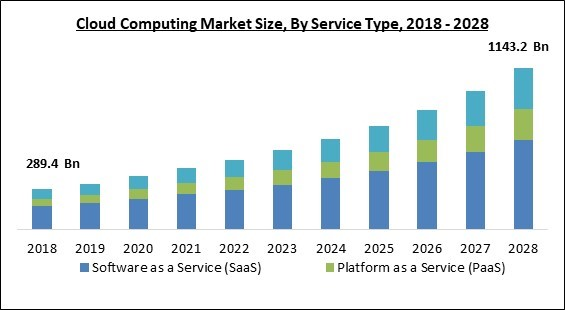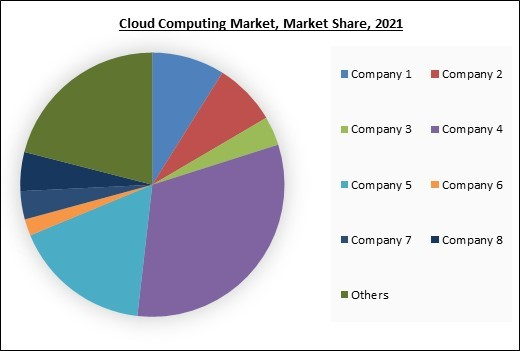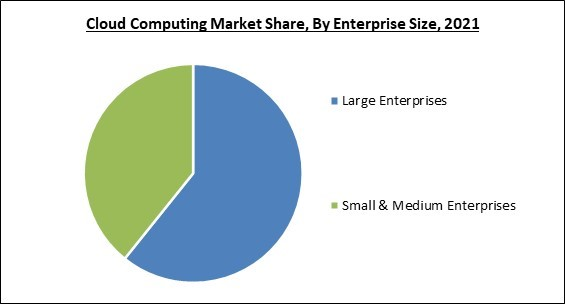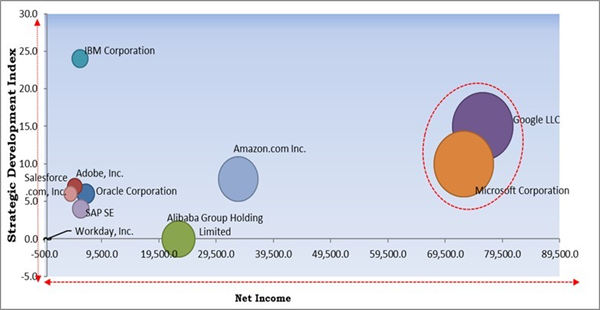Cloud computing helps in running business operations quickly and effectively in response to changing market conditions. It has opened up previously unimaginable opportunities to develop a very engaging consumer experience. By the help of the cloud computing, people and businesses have changed their behavior, and multiple business lines are now able to get things done by skirting IT regulations.
Fundamentally, corporate spending, digital business decisions, and vendor & technology selection are all being impacted by cloud developments. Emerging technologies like artificial intelligence (AI) and ML (machine learning) make it possible for businesses to use AI capabilities, which promotes cloud expansion. Rapid digitalization is forcing organizations to change their application and infrastructure landscapes in order to improve cost effectiveness along with business agility.
By integrating cloud solutions and services, businesses may support their new core business operations, move corporate workloads to a cloud platform, and lower network latency. Data security and privacy are organizations' top priorities, which necessitates digital protection for information storage, use, and transmission. Some of the crucial security services provided by the vendors include data encryption, authorization management, cloud integration, access control, communication security, monitoring & auditing, and business continuity services.
Because cloud computing services offer insights into partnership methods, go-to-market plans, alliances, investments, alliance and acquisition strategies, and best operational practices, businesses are embracing them. Cloud computing services also make it easier to track, compare, and evaluate business activities and make sure that business operations are in accordance with client requests.
The leading players in the market are competing with diverse innovative offerings to remain competitive in the market. The below illustration shows the percentage of revenue shared by some of the leading companies in the market. The leading players of the market are adopting various strategies in order to cater demand coming from the different industries. The key developmental strategies in the market are Partnerships & Collaborations.
COVID-19 Impact Analysis
One of the biggest changes in the workplace is anticipated to result from the pandemic. In order to speed up Industry 4.0, the fourth industrial revolution, it is changing how companies use smart technologies like mobile supercomputing, big data, IoT, and artificial intelligence. In Q3 2020, the cloud computing market saw an increase in demand as businesses continued to move workloads from analog to digital formats. To maintain the well-being of employee along with operational efficiency, many businesses from a number of industries have switched to the work-from-home model, which has raised the demand for Software-as-a-Service (SaaS)-based solutions.Market Growth Factors
Reduced Infrastructure And Storage Costs & Increased Return On Investments
The upfront setup as well as ongoing maintenance costs of on-premises data hosting are a matter to concern for businesses. Additional worries for businesses include downtime issues, staff costs, and electricity costs. The adoption of cost-effective strategies to rebuild business models has intensified due to the existing competitive environment and economic conditions of the world. Some of the other variables that is expected to support the acceptance of cloud computing services and, eventually, reduce the business costs include the shifting business priorities toward digital transformation and the speeding consumer experience.More People Are Using Hybrid Cloud Services
Businesses with current infrastructure are embracing cloud computing services and are prepared to use a hybrid strategy so they may profit from both on-premises and cloud services. Due to the certain advantages, such as no upfront infrastructure setup fees as well as the availability of computing services on demand, SMEs are widely adopting cloud computing services. These elements are supporting the surge in demand for cloud services in various organizations. Improved workload management, more security & compliance, and effective integration within DevOps teams are all advantages of the hybrid cloud.Market Restraining Factors
Critical Data Loss And Corporate Operations Being Damaged By Cyberattacks
Cloud computing services assist businesses in increasing operational effectiveness and cutting costs. Additionally, these services have a number of benefits, such as scalability, flexibility, and agility. The data stored in the cloud is still vulnerable to hackers even though the cloud provides a number of advantages and security precautions. The amount of data being produced is growing, and businesses are starting to take more steps toward digital transformation. Enterprise data is exposed to risk from cyberattacks like Specter, Meltdown, cloud malware injection assaults, account or service hijacking, and man-in-the-cloud attacks.Service Type Outlook
On the basis of service type, the cloud computing market is classified into infrastructure as a service (IaaS), platform as a service (PaaS), and software as a service (SaaS). The IaaS segment covered a substantial revenue share in the cloud computing market in 2021. The demand for IaaS is increasing due to the rising desire to minimize IT complexity, engage a qualified workforce to manage the IT infrastructures, and lower deployment costs for data centers.Deployment Outlook
By deployment, the cloud computing market is divided into public, private, and hybrid. The hybrid segment acquired a significant revenue share in the cloud computing market in 2021. The hybrid model has been the most popular implementation methodology across sectors. Many businesses are putting more emphasis on creating hybrid cloud models and clever strategies to help improve business operations, resource consumption, cost efficiency, user experience, and application modernization while maximizing the benefits.Enterprise Size Outlook
On the basis of enterprise size, the cloud computing market is fragmented into large enterprises, and small & medium enterprises. The small and medium-sized enterprises (SMEs) segment acquired a significant revenue share in the cloud computing market in 2021. The rise is attributable to the expansion of SMEs in developing nations like China as well as India. The market is also expected to grow as a result of an increase in SMEs' need for cloud computing services to streamline workflow and save operating expenses.End-User Outlook
Based on end-user, the cloud computing market is segmented into BFSI, IT & telecom, retail & consumer goods, manufacturing, energy & utilities, healthcare, media & entertainment, government & public sectors and others. The BFSI segment witnessed the highest revenue share in the cloud computing market in 2021. Moneylenders have adopted digital transformation as a result of a growth in online banking activity in the BFSI industry, with cloud computing playing a crucial part in this strategy.Regional Outlook
Region wise, the cloud computing market is analyzed across North America, Europe, Asia Pacific and LAMEA. In 2021, the North America segment accounted the maximum revenue share in the cloud computing market. Companies in the United States prioritize digital transformation, and they are frequently seen as early adopters of cutting-edge technologies like the Internet of Things (IoT), big data analytics, additive manufacturing, connected industries, AI, augmented reality (AR), machine learning (ML), and virtual reality (VR), as well as the newest telecommunications technologies like 4G, 5G, and LTE.Cardinal Matrix - Cloud Computing Market Competition Analysis
The major strategies followed by the market participants are Partnerships. Based on the Analysis presented in the Cardinal matrix; Google LLC and Microsoft Corporation are the forerunners in the Cloud Computing Market. Companies such as Amazon.com Inc., IBM Corporation, Adobe, Inc. are some of the key innovators in Cloud Computing Market.
The market research report covers the analysis of key stake holders of the market. Key companies profiled in the report include Google LLC, IBM Corporation, Oracle Corporation, Amazon.com, Inc., Microsoft Corporation, SAP SE, Salesforce.com, Inc., Adobe, Inc., Alibaba Group Holding Limited, and Workday, Inc.
Strategies deployed in Cloud Computing Market
; Partnerships, Collaborations and Agreements:
- Jul-2022: Oracle collaborated with Claro, a Mexican telecom group. This collaboration focused on jointly offering Oracle Cloud Infrastructure (OCI) services to the public as well as private sector organizations and enterprises in Colombia. In addition, the collaboration is expected to accelerate the technology modernization of businesses and customers across Latin America. The collaboration with Claro is expected to also accelerate cloud adoption, stimulate economic recovery, and spur competitiveness in these nations.
- Jun-2022: Oracle entered into a partnership with Kyndryl, an IT infrastructure services provider. From this partnership, the companies aimed at helping consumers accelerate their journey to the cloud by delivering managed cloud solutions to enterprises all over the world. This partnership is expected to expand the company's reach, helping more consumers across the world move critical workloads to the cloud.
- Jun-2022: AWS signed an agreement with Redington India, an information technology (IT) provider. From this agreement, the companies focused on driving cloud technology adoption in India. Also, this agreement is expected to enable AWS to extend the power of the AWS Cloud to more partners and customers across the metros, and tier-2 and 3 cities in India.
- May-2022: IBM joined hands with Amazon Web Services, a subsidiary of Amazon that provides on-demand cloud computing platforms. The company focused on offering a broad array of its software catalog as Software-as-a-Service (SaaS). Through this collaboration, IBM took another major step in giving organizations the ability to choose the hybrid cloud model that works best for their own needs and workloads, freeing them up to instead focus on solving their most pressing business challenges.
- May-2022: Oracle partnered with Informatica, an enterprise cloud data management leader. This partnership is expected to bring compelling value to the companies' joint consumers with the fastest, most cost-effective path to OCI.
- Mar-2022: Google teamed up with Adani Group, an Indian multinational conglomerate. Under this collaboration, The Adani Group is expected to drive up the next phase of digital innovation across its diversified business portfolio. The collaboration is expected to tap into the companies' expertise across best-in-class infrastructure, technology, and industry solutions to modernize the Adani Group’s IT operations at scale.
- Mar-2022: Microsoft partnered with FD Technologies, a group of data-driven businesses. Through this partnership, the companies focused on expanding the reach of its KX Insights streaming data analytics platform. With the combination of Microsoft's Intelligent Cloud capabilities with KX technology and expertise, the companies is expected to look forward to empower the capital markets and financial services, consumers, with latest, compelling solutions for faster decision-making and innovation
- Feb-2022: Microsoft signed an MoU to collaborate with Larsen & Toubro, an Indian multinational conglomerate company. The collaboration focused on developing a regulated sector-focused cloud offering. In addition, the collaboration aimed to support the public sector and the other regulated industries as they seek to accelerate digital services to benefit all parts of India.
- Feb-2022: Google Cloud collaborated with Elisa, finnish telecommunication & digital services producer. This collaboration aimed at accelerating Elisa's cloud transformation journey and working together on joint innovations in several areas. Further, this collaboration is expected to enable Elisa to leverage Google Cloud's infrastructure, advanced data analytics, storage, and hybrid cloud management services to speed up its go-to-market activities, explore the latest edge computing possibilities, and build improved experiences for Elisa's consumers.
- Feb-2022: AWS came into a partnership with Kyndryl, the world's largest IT infrastructure services provider. The partnership aimed at empowering, educating, and allowing thousands of AWS certified practitioners and developing joint solutions that is expected to accelerate consumers' journeys and help them innovate on the world's leading cloud.
- Jun-2021: Amazon Web Services extended its existing partnership with Salesforce, an American cloud-based software company. By the expansion of the partnership, the companies is expected to make it easy for consumers to utilize the whole set of Salesforce and AWS abilities together to quickly build and deploy powerful latest business applications that accelerate digital transformation.
- Jun-2021: Amazon Web Services signed an agreement to partner with Axis Bank, an Indian banking and financial services company. The Amazon subsidiary provides on-demand cloud computing services to organizations across the world and is expected to help to accelerate the bank’s transformation in face of growing demand for digital services. Under this partnership, the AWS is expected to help Axis Bank build and rise a suite of digital banking services that evolve with technology changes, introduce the latest payment modes, and support evolving customer and business requirements in India.
- Dec-2020: Microsoft teamed up with Johnson, an American multinational corporation. The collaboration aimed to digitally transform how buildings and spaces are conceived, built, and managed. By integrating the power of Azure Digital Twins with JCI’s OpenBlue Digital Twin platform, this collaboration is expected to serve consumers with a digital replica and actionable insights to better meet their evolving requirements.
; Product Launches and Product Expansions:
- Jun-2022: Salesforce introduced Sales Cloud Unlimited, a unified platform with everything sales teams in one place. The companies aimed to drive growth and turn sales reps into trusted advisors. Sales Cloud is an all-in-one platform for sales where AI (powered by Einstein), automation, and analytics come standard, allowing every sales rep to be more efficient.
- Jun-2022: Salesforce launched new Customer 360 innovations. This launch aimed to help companies tap into the power of automation so they can focus on what matters most driving productivity and building trusted relationships with consumers.
- Dec-2021: IBM launched Cloud Modernization Center, a digital front door to a vast array of tools, training, resources, and ecosystem partners. The launch aimed at helping IBM clients accelerate the modernization of their applications, data, and processes in an open hybrid cloud architecture. As part of the IBM Z Cloud and Modernization Center, clients could access a digital journey showcasing comprehensive resources and guidance for business professionals, IT executives, and developers alike.
- Dec-2021: Adobe unveiled Creative Cloud Express, a simple, template-based tool. This latest tool is expected to allow drag-and-drop content creation, empowering every user to express their creativity with just a few clicks.
- May-2021: Google Cloud launched Vertex AI, the latest managed machine learning platform. Vertex AI is designed to make it easier for developers to deploy and maintain their AI models. This latest product allows better deployments for a new generation of AI that is expected to empower data scientists and engineers to do fulfilling and creative work. Ultimately, the goal with Vertex is to reduce the time to ROI for these enterprises, to make sure that they cannot just build a model but get real value from the models they’re building.
- Mar-2021: IBM released IBM Cloud Satellite, an extension of the IBM Public Cloud. The IBM Public Cloud is expected to enable its enterprise clients to launch consistent cloud services anywhere and in any environment across any cloud, on-premises, or at the edge.
; Acquisitions and Mergers:
- Mar-2022: SAP SE acquired Taulia, a leading provider of working capital management solutions. This acquisition aimed to expand SAP’s business network and strengthen SAP’s solutions for the CFO office. Taulia’s solutions is expected to be tightly integrated into SAP software as well as continue to be available standalone. In addition, Taulia is expected to operate as an independent company with its own brand within the SAP Group.
- Mar-2022: Microsoft took over Nuance Communications, a leader in conversational AI and ambient intelligence industries. This partnership aimed to bring together Nuance’s best-in-class conversational AI and ambient intelligence with Microsoft’s secure as well as trusted industry cloud offerings. Also, this partnership is expected to help providers offer more affordable, effective, and accessible healthcare, and help businesses in every industry create more personalized and meaningful customer experiences.
- Feb-2022: IBM acquired Sentaca, a provider of telco consulting services and solutions. This acquisition focused on improving its hybrid cloud capabilities. Through this acquisition, Sentaca is expected to become part of IBM Consulting and is expected to be integrated into its Hybrid Cloud Services business in North America.
- Nov-2021: IBM completed the acquisition of SXiQ, an Australian digital transformation services company. This acquisition aimed to bring additional hybrid and multi-cloud expertise that is at the core of open innovation for clients. SXiQ is expected to improve IBM Consulting's abilities in Australia and New Zealand to modernize applications and technology infrastructure in the cloud.
- Jun-2021: IBM took over Turbonomic, an Application Resource Management (ARM) and Network Performance Management (NPM) software provider. This acquisition aimed to enable IBM to become the only company providing a one-stop shop of AI-powered automation capabilities, all built on Red Hat OpenShift to run anywhere.
- Dec-2020: IBM acquired FinTech Expertus Technologies, a Montreal-based fintech company. By the acquisition, IBM is expected to gain consulting experience from Expertus on addressing the latest challenges in payments coming in the next several years. Also, the acquisition is expected to broaden IBM's capability to deal with complicated integrations of technologies, people, and processes.
- Dec-2020: Adobe acquired Workfront, the leading work management platform for marketers. The acquisition aimed to give leading brands access to a single system to support planning, collaboration, and governance, to unlock organizational productivity.
- Dec-2020: Google signed an agreement to acquire Actifio, a privately held information technology firm. Under this acquisition, Actifio’s business continuity solutions is expected to help Google Cloud consumers prevent data loss and downtime because of network failures, external threats, human errors, and other disruptions.
- Feb-2020: Google Cloud took over Looker, a Santa Cruz data analytics company. The acquisition aimed to strengthen the company’s analytics and data warehouse capabilities, which include BigQuery, allowing the consumers to address some of their toughest business challenges, faster all while maintaining complete control of their data.
Scope of the Study
Market Segments Covered in the Report:
By Service Type
- Software as a Service (SaaS)
- Platform as a Service (PaaS)
- Infrastructure as a Service (IaaS)
By Deployment
- Public
- Private
- Hybrid
By Enterprise Size
- Large Enterprises
- Small & Medium Enterprises
By End-use
- BFSI
- IT & Telecom
- Retail & Consumer Goods
- Manufacturing
- Media & Entertainment
- Energy & Utilities
- Healthcare
- Government & Public Sector
- Others
By Geography
- North America
- US
- Canada
- Mexico
- Rest of North America
- Europe
- Germany
- UK
- France
- Russia
- Spain
- Italy
- Rest of Europe
- Asia Pacific
- China
- Japan
- India
- South Korea
- Singapore
- Malaysia
- Rest of Asia Pacific
- LAMEA
- Brazil
- Argentina
- UAE
- Saudi Arabia
- South Africa
- Nigeria
- Rest of LAMEA
Key Market Players
List of Companies Profiled in the Report:
- Google LLC
- IBM Corporation
- Oracle Corporation
- Amazon.com, Inc.
- Microsoft Corporation
- SAP SE
- com, Inc.
- Adobe, Inc.
- Alibaba Group Holding Limited
- Workday, Inc.
Unique Offerings from the Publisher
- Exhaustive coverage
- The highest number of Market tables and figures
- Subscription-based model available
- Guaranteed best price
- Assured post sales research support with 10% customization free
Table of Contents
Companies Mentioned
- Google LLC
- IBM Corporation
- Oracle Corporation
- Amazon.com, Inc.
- Microsoft Corporation
- SAP SE
- Salesforce.com, Inc.
- Adobe, Inc.
- Alibaba Group Holding Limited
- Workday, Inc.












